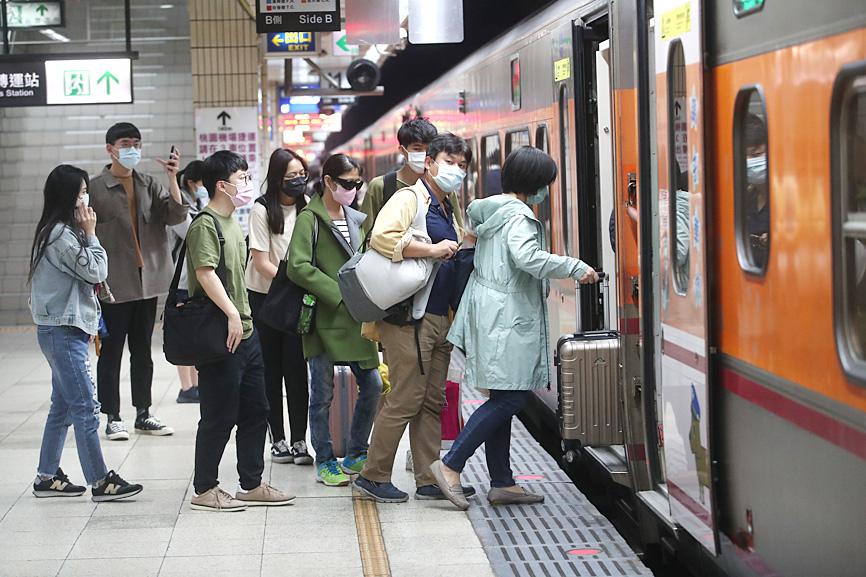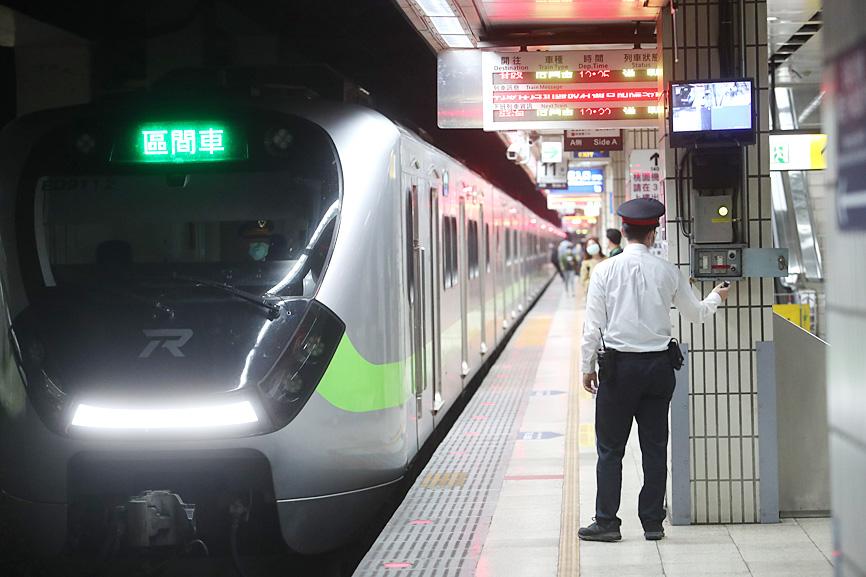Additional transportation capacity from Taiwan High Speed Rail Corp (台灣高鐵) and bus companies across the nation will cover any shortfall in transportation capacity on May 1, the Ministry of Transportation and Communications said yesterday, as it presented its contingency plan in response to the Taiwan Railway Labor Union’s plan to strike on Workers’ Day.
The work stoppage is estimated to affect transportation services for 358,000 passengers, said the ministry, which oversees the Taiwan Railways Administration (TRA).
About 13,000 of the TRA’s 15,000 employees are members of the union, which on Tuesday said that, based on its survey, more than 90 percent of the its drivers would not work on Workers’ Day to protest a government plan to corporatize the agency.

Photo: CNA
TRA Director-General Du Wei (杜微) told a ministry news conference yesterday that the agency estimated it would require help in transporting 211,000 passengers on service lines in western Taiwan, 41,000 passengers across eastern Taiwan, and 106,000 for local and ancillary service lines.
The TRA estimated that the high-speed rail could help transport 90,000 passengers, while highway bus services could assist in transporting 136,000 passengers in western Taiwan, Du said.
In the east, bus operators have said they could offer 82,000 seats to assist the TRA, he said, adding that MRT and city bus lines would be used to ferry passengers in local areas serviced by ancillary lines.

Photo: CNA
A “train-like program” — in essence, buses on routes following the railway tracks bearing the same designation as the train lines — of 594 buses would provide 23,760 seats in total, Director-General of Highways Chen Wen-jui (陳文瑞) said.
The TRA is still trying to convince train drivers mot to strike, Du added.
Freeway Bureau Traffic Division Director Tsai Ming-che (蔡明哲) estimated that the strike would not increase highway traffic volume and said contingency plans are in place if it does.
Minister of Transportation and Communications Wang Kuo-tsai (王國材) apologized for the inconvenience caused by the impending strike, but said he would not give up any chance to turn the situation around before Workers’ Day.
Wang said that he was “unhappy” over the TRA strike, because it is causing the agency to lose established clientele.
He urged the union to reconsider and not harm passengers’ interests.

‘LAGGING BEHIND’: The NATO secretary-general called on democratic allies to be ‘clear-eyed’ about Beijing’s military buildup, urging them to boost military spending NATO Secretary-General Mark Rutte mentioning China’s bullying of Taiwan and its ambition to reshape the global order has significance during a time when authoritarian states are continuously increasing their aggression, the Ministry of Foreign Affairs (MOFA) said yesterday. In a speech at the Carnegie Europe think tank in Brussels on Thursday, Rutte said Beijing is bullying Taiwan and would start to “nibble” at Taiwan if Russia benefits from a post-invasion peace deal with Ukraine. He called on democratic allies to boost defense investments and also urged NATO members to increase defense spending in the face of growing military threats from Russia

LEAP FORWARD: The new tanks are ‘decades more advanced than’ the army’s current fleet and would enable it to compete with China’s tanks, a source said A shipment of 38 US-made M1A2T Abrams tanks — part of a military procurement package from the US — arrived at the Port of Taipei early yesterday. The vehicles are the first batch of 108 tanks and other items that then-US president Donald Trump announced for Taiwan in 2019. The Ministry of National Defense at the time allocated NT$40.5 billion (US$1.25 billion) for the purchase. To accommodate the arrival of the tanks, the port suspended the use of all terminals and storage area machinery from 6pm last night until 7am this morning. The tanks are expected to be deployed at the army’s training

PEACEFUL RESOLUTION: A statement issued following a meeting between Australia and Britain reiterated support for Taiwan and opposition to change in the Taiwan Strait Canada should support the peaceful resolution of Taiwan’s destiny according to the will of Taiwanese, Canadian lawmakers said in a resolution marking the second anniversary of that nation’s Indo-Pacific strategy on Monday. The Canadian House of Commons committee on Canada-Chinese relations made the comment as part of 34 recommendations for the new edition of the strategy, adding that Ottawa should back Taiwan’s meaningful participation in international organizations. Canada’s Indo-Pacific Strategy, first published in October 2022, emphasized that the region’s security, trade, human rights, democracy and environmental protection would play a crucial role in shaping Canada’s future. The strategy called for Canada to deepen

TECH CONFERENCE: Input from industry and academic experts can contribute to future policymaking across government agencies, President William Lai said Multifunctional service robots could be the next new area in which Taiwan could play a significant role, given its strengths in chip manufacturing and software design, Taiwan Semiconductor Manufacturing Co (TSMC, 台積電) chairman and chief executive C.C. Wei (魏哲家) said yesterday. “In the past two months, our customers shared a lot of their future plans with me. Artificial intelligence [AI] and AI applications were the most talked about subjects in our conversation,” Wei said in a speech at the National Science and Technology Conference in Taipei. TSMC, the world’s biggest contract chipmaker, counts Nvidia Corp, Advanced Micro Devices Inc, Apple Inc and